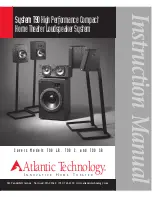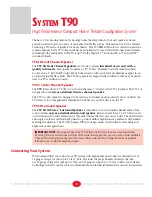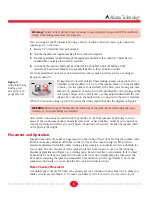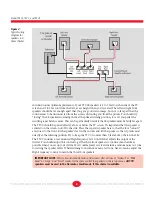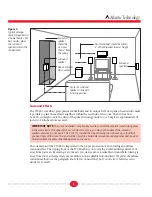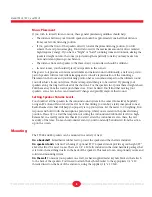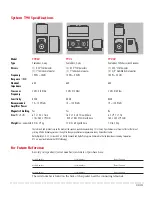
○ ○ ○ ○ ○ ○ ○ ○ ○ ○ ○ ○ ○ ○ ○ ○ ○ ○ ○ ○ ○ ○ ○ ○ ○ ○
3
○ ○ ○ ○ ○ ○ ○ ○ ○ ○ ○ ○ ○ ○ ○ ○ ○ ○ ○ ○ ○ ○ ○ ○ ○ ○
Atlantic Technology
®
Warning:
To prevent risk of electrical shock or damage to your equipment, always switch off the amplifier or
receiver when making connections to the speakers.
You can connect your T90 speakers by using a variety of audio connectors such as pin connectors,
spade lugs, etc., or you can:
1.
Remove 1/2" of insulation from each wire end.
2.
Twist the stranded wire together, keeping the two conductors separate.
3.
Place the appropriate conductor through the appropriate postholes in the connectors. These holes are
revealed when you loosen the connector capscrew.
4.
Screw down the capscrew tightly, but be careful not to over tighten. Check the tightness of the
capscrews 24 hours after hookup and occasionally thereafter, as they can loosen over time.
We recommend that you check your local electrical codes to make sure that you are not using an
improper connector.
It’s important to observe polarity while making speaker connections: red (+)
terminals on the amplifier to red (+) on the speaker, black (-) on the amplifier
to black (-) on the speaker. Look carefully at the wires you are using and note
that one of conductors of each pair will be identified by color, printing on the
outer jacket, ridges on the outer jacket, or a thread intertwined with the wire
strands. By convention, the marked wire is connected to the red (+) terminal.
When you’re done hooking up your T90 system the wiring should look like the diagram in Figure 2.
WARNING:
Before turning on the amplifier, be certain that no stray wire strands are touching across any
terminals, as this might damage your amplifier.
After all the connections are made check the polarity of your front speakers by listening to stereo
music. If the sound seems hollow, unusually spread out, or has weak bass, recheck your connections
for proper polarity and reverse any out of phase connections, if necessary. Usually one speaker wired
out of phase is the culprit.
Placement and Operation
Speaker/room interactions have a huge impact on the sound of the system. Moving the speakers just a
little bit can make a dramatic difference in what you hear. The compact design of T90 provides
maximum placement flexibility, while creating a large, seamless, acoustically accurate soundfield for
your system. The best placement of the speakers will vary from room to room. Use the following
placement guidelines and Figure 3 as a starting point. But also feel free to experiment. In fact, it may
be beneficial to hook up the speakers with some extra wire and to simply drape the wire across the
floor before installing the speakers permanently. This will allow you the opportunity to move the
speakers around easily so you can find the best sonic and visual locations.
Home Theater Placement
Our philosophy is simple. We believe the primary goal of a surround sound system isn’t to make you
think you’re in a movie theater. It’s to make you believe you’re
in the movie or at the concert
. So for
Figure 1:
Gold plated 5-way
binding posts.
Accepts up to 10
gauge bare wire

